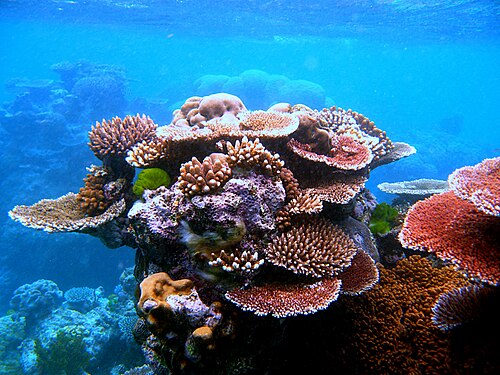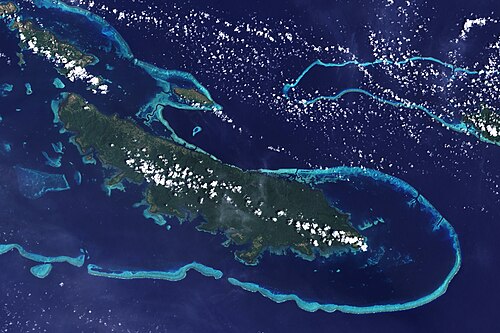Coralnoun
(uncountable) A hard substance made of the limestone skeletons of marine polyps.
Coralnoun
(countable) A colony of marine polyps.
Coralnoun
(countable) A somewhat yellowish pink colour, the colour of red coral.
Coralnoun
The ovaries of a cooked lobster; so called from their colour.
Coralnoun
(historical) A piece of coral, usually fitted with small bells and other appurtenances, used by children as a plaything.
Coraladjective
Made of coral.
Coraladjective
Having the yellowish pink colour of coral.
Coralnoun
The hard parts or skeleton of various Anthozoa, and of a few Hydrozoa. Similar structures are also formed by some Bryozoa.
Coralnoun
The ovaries of a cooked lobster; - so called from their color.
Coralnoun
A piece of coral, usually fitted with small bells and other appurtenances, used by children as a plaything.
Coralnoun
a variable color averaging a deep pink
Coralnoun
the hard stony skeleton of a Mediterranean coral that has a delicate red or pink color and is used for jewelry
Coralnoun
unfertilized lobster roe; reddens in cooking; used as garnish or to color sauces
Coralnoun
marine colonial polyp characterized by a calcareous skeleton; masses in a variety of shapes often forming reefs
Coraladjective
of a strong pink to yellowish-pink color
Coralnoun
a hard stony substance secreted by certain marine coelenterates as an external skeleton, typically forming large reefs in warm seas
Coralnoun
precious red coral, used in jewellery
Coralnoun
the pinkish-red colour of red coral
Coralnoun
a sedentary coelenterate of warm and tropical seas, with a calcareous, horny, or soft skeleton. Most corals are colonial and many rely on the presence of green algae in their tissues to obtain energy from sunlight.
Coralnoun
the unfertilized roe of a lobster or scallop, which is used as food and becomes reddish when cooked
Coral
Corals are marine invertebrates within the class Anthozoa of the phylum Cnidaria. They typically form compact colonies of many identical individual polyps.
Reefnoun
A chain or range of rocks, sand, or coral lying at or near the surface of the water.
Reefnoun
A large vein of auriferous quartz; hence, any body of rock yielding valuable ore.
Reefnoun
(nautical) A portion of a sail rolled and tied down to lessen the area exposed in a high wind.
Reefnoun
A reef knot.
Reefnoun
The itch; any eruptive skin disorder.
Reefnoun
Dandruff.
Reefverb
(nautical) To take in part of a sail in order to adapt the size of the sail to the force of the wind.
Reefverb
(Australian) To pull or yank strongly, especially in relation to horse riding.
Reefverb
To move the floats of a paddle wheel toward its center so that they will not dip so deeply.
Reefverb
(slang) To manipulate the lining of a person's pocket in order to steal the contents unnoticed.
Reefadjective
Scabby; scurvy.
Reefnoun
A chain or range of rocks lying at or near the surface of the water. See Coral reefs, under Coral.
Reefnoun
A large vein of auriferous quartz; - so called in Australia. Hence, any body of rock yielding valuable ore.
Reefnoun
That part of a sail which is taken in or let out by means of the reef points, in order to adapt the size of the sail to the force of the wind.
Reefverb
To reduce the extent of (as a sail) by rolling or folding a certain portion of it and making it fast to the yard or spar.
Reefnoun
a submerged ridge of rock or coral near the surface of the water
Reefnoun
a rocky region in the southern Transvaal in northeastern South Africa; contains rich gold deposits and coal and manganese
Reefverb
lower and bring partially inboard;
Reefverb
roll up (a portion of a sail) in order to reduce its area
Reefverb
reduce (a sail) by taking in a reef
Reef
A reef is a ridge or shoal of rock, coral or similar relatively stable material, lying beneath the surface of a natural body of water. Many reefs result from natural, abiotic processes—deposition of sand, wave erosion planing down rock outcrops, etc.—but there are also reefs such as the coral reefs of tropical waters formed by biotic processes dominated by corals and coralline algae, and artificial reefs such as shipwrecks and other anthropogenic underwater structures may occur intentionally or as the result of an accident, and sometimes have a designed role in enhancing the physical complexity of featureless sand bottoms, to attract a more diverse assemblage of organisms.







































